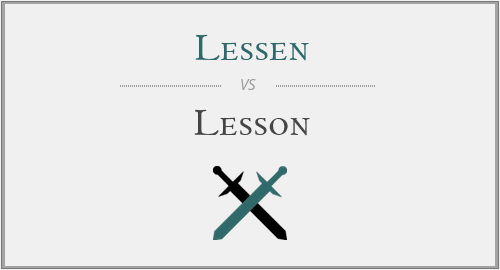Lessen
Lessen is a verb that means to make something smaller or reduce in amount, intensity, or degree. It is often used to describe the decrease or alleviation of a problem, difficulty, or burden.
For example, if a person takes pain medication, it may lessen their discomfort. If a company implements cost-cutting measures, it may lessen its financial burden. If a country reduces its carbon emissions, it may lessen its environmental impact.
Some synonyms of lessen include decrease, diminish, and reduce.
Lesson
Lesson is a noun that refers to a unit of instruction, usually given in a classroom setting, aimed at imparting knowledge or skill. It can also refer to a moral or practical teaching that can be learned from an experience or situation.
For example, a student may attend a math lesson to learn algebraic equations. A person who makes a mistake may learn a lesson from the experience and avoid making the same mistake in the future. A story or fable may contain a moral lesson, such as the importance of honesty or courage.

Some synonyms of lesson include class, lecture, and instruction.
Usage
It is important to use the terms lessen and lesson correctly in different contexts. Lessen is used to describe a reduction or decrease, while lesson is used to describe an educational or moral teaching.
Here are some examples of correct usage:
- "The rain helped lessen the drought conditions in the area."
- "The teacher gave a lesson on grammar rules."
- "The company's cost-cutting measures have lessened its financial burden."
- "The experience taught her a valuable lesson about trust."
Conclusion
Lessen and lesson may sound similar, but they have different meanings and usage in the English language. Lessen refers to a decrease or reduction, while lesson refers to an educational or moral teaching. By understanding the difference between these two terms, we can use them correctly in our communication and avoid confusion.




Have a discussion about this article with the community:
Report Comment
We're doing our best to make sure our content is useful, accurate and safe.
If by any chance you spot an inappropriate comment while navigating through our website please use this form to let us know, and we'll take care of it shortly.
Attachment
You need to be logged in to favorite.
Log In